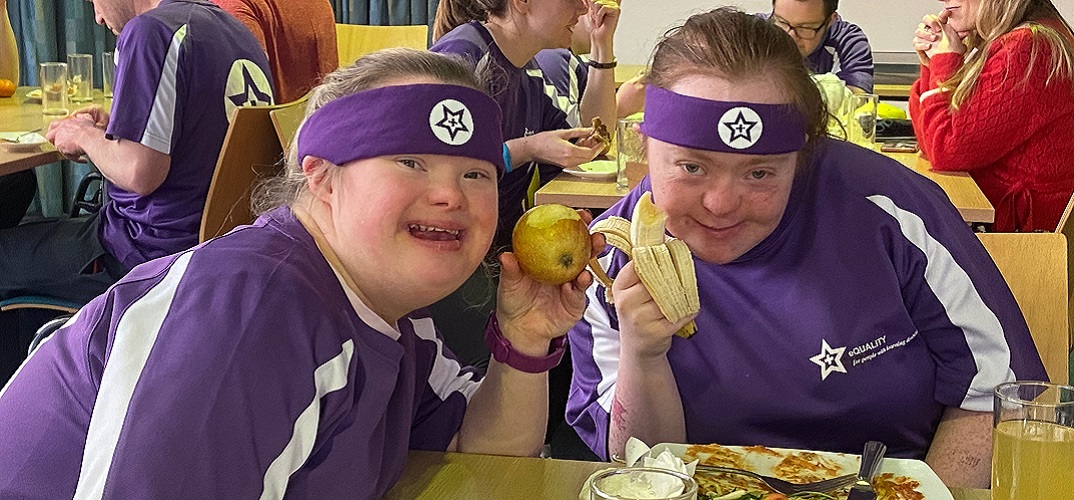New resource helps people with learning disabilities understand the benefits of vaccinations

On Friday 22 September, researchers from the University of Hertfordshire and charity Beyond Words will launch a new resource that helps people with learning disabilities to understand the importance of vaccines, and take informed decisions about their health.
Funded by the RCN Foundation, the project was initially launched in 2021 to develop a visual resource that guides people through the benefits and practical process of getting the vaccine against COVID-19. Now, it has been expanded to assist people with learning disabilities – and their families and carers – to have open conversations about the benefits of other vaccines for long-term health and wellbeing.
During the first months of the pandemic, Public Health England reported that individuals with learning disabilities were at greater risk of dying from COVID-19. With the roll-out of the winter booster programme starting earlier than planned due to the newly-identified Pirola variant, there remains an urgent need to encourage people to take up their vaccines, and help them understand the benefits.
The pandemic starkly highlighted the increased health risks for people with learning disabilities, but this vulnerability is a long-standing problem. Studies show that people with learning disabilities experience significant health inequalities, including poor quality healthcare that is responsible for avoidable hospitalisations and deaths.
The team behind the new ‘Having a Vaccine’ book hope that the resource will encourage people to receive other necessary vaccinations such as flu, to protect them against preventable illnesses.
Dr Helena Wythe, Senior Research Fellow at the University of Hertfordshire, explains why this kind of resource is so important to invest in: “Thankfully, we saw a high uptake of the COVID-19 vaccine across the community here in Hertfordshire. However, it’s not just about the number of vaccines in people’s arms. It’s important that people with learning disabilities aren’t shut out of the conversation around vaccines, but understand why they are so important and play an active part in these kind of healthcare decisions.
“This is particularly important as COVID-19, and the importance of the vaccine, is no longer front and centre in the media. We hope this resource will help people to continue conversations about the importance of protecting their health, in many ways, in the long term”.
‘Having a Vaccine’ was created by charity Beyond Words who specialise in creating visual stories designed for – and co-created with – people who find pictures easier to understand than words. They use visual literacy as a communication tool to empower people and remove barriers to understanding.
Katie Smith, CEO of Beyond Words, said: “Picture-based, word-free resources like these are vitally important in helping people who find visual mediums easier to understand than written ones. They allow people to build understanding of the vaccination process, as well as having open discussions about their anxieties, questions, and emotions. We are delighted to have been able to bring our approach to such a valuable resource”.
Staff at the University of Hertfordshire’s School of Health and Social Work ensured the book meets these aims by conducting an evaluation of its impact. This included interviewing and surveying people with intellectual disabilities, carers, and health/social care professionals, as well as mapping resource distribution and vaccine uptake data. The research resulted in refinements to the resource, for example how to address the issue of needle phobia through imagery. One participant said:
"We need to promote what people with learning disabilities can do… not what they can’t do. I think that booklet’s going to save many more lives”.
The launch at the RCN Foundation this week will invite the audience to take part in a ‘book club’ reading of the resource, to reflect how it is used in practice, as well as watching performances from Hertfordshire-based Purple All-Stars who helped to develop the book.
Deepa Korea, RCN Foundation Director, said: "The COVID-19 pandemic highlighted alarming health disparities, especially among individuals with lived experience of a learning disability, who faced a mortality rate 3.6 times higher than the general population. Addressing these inequalities is a top priority for the RCN Foundation and we are proud to have funded this resource, designed to not only aid those seeking the COVID-19 vaccination, but also individuals receiving other vaccinations and immunisations administered via a needle."